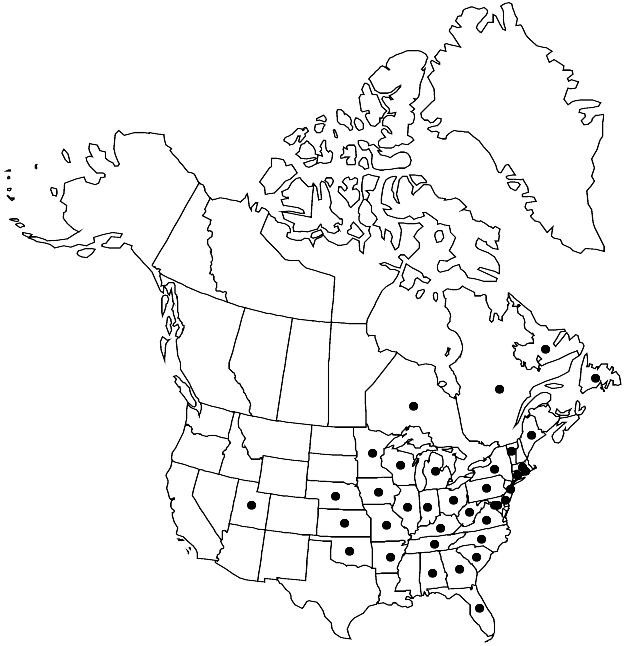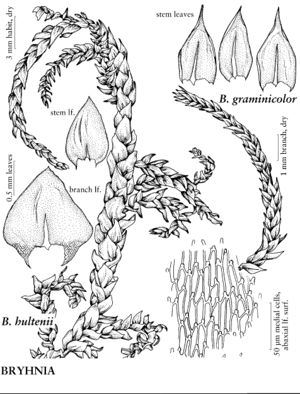Bryhnia graminicolor
Bull. Torrey Bot. Club 25: 231. 1898.
Plants small, in moderately dense tufts, light green or brownish yellow-green. Stems to 2 cm, creeping to ascending, straight or flexuose, terete-foliate, not julaceous, regularly pinnate, branches to 5 mm, straight, terete-foliate. Stem-leaves rigidly spreading, narrowly ovate to lanceolate, broadest at 1/6–1/5 leaf length, not or slightly plicate, longer than broad, 0.6–1.1 × 0.2–0.5 mm; base short-decurrent; margins serrulate to serrate almost to base; apex gradually acuminate; costa to 60–80% leaf length, moderately weak, terminal abaxial spine present; alar cells subquadrate to short-rectangular, 10–20 × 7–9 µm, walls moderately thick, region of 4 × 4 cells, not pellucid, sometimes obscured by recurved margins, indistinctly differentiated; laminal cells 25–45 × 5–6 µm, distal corners strongly papillose; basal-cells 7–8 µm wide, region in 2 rows. Seta 0.7–1.5 cm. Capsule inclined, not or slightly curved, 1.6 mm. Spores 13–15 µm.
Habitat: Rock faces, crevices, ledges, soil, steep banks along roads and creeks, wood, moist shaded to open habitats
Elevation: low to high elevations (0-2100 m)
Distribution

Nfld. and Labr., Ont., Que., Ala., Ark., Conn., Del., D.C., Fla., Ga., Ill., Ind., Iowa, Kans., Ky., Maine, Md., Mass., Mich., Minn., Mo., Nebr., N.J., N.Y., N.C., Ohio, Okla., Pa., R.I., S.C., Tenn., Utah, Vt., Va., W.Va., Wis.
Discussion
Bryhnia graminicolor usually grows at low elevations, reaching 900 m in the Appalachian Mountains. There is one collection from Utah: Utah County, Mt. Timpanogos, 2040 m, wet logs, lumber, Flowers 17045 (MO). This is the most western collection of this species, and the habitat is unusual. This discovery was not included by S. Flowers (1973), and mislabeling of the specimen is suspected in this case. Confirmation of the occurrence of B. graminicolor in the western states is necessary.
Selected References
None.
Lower Taxa
"long" is not a number."broad" is not a number."broad" is not a number.
